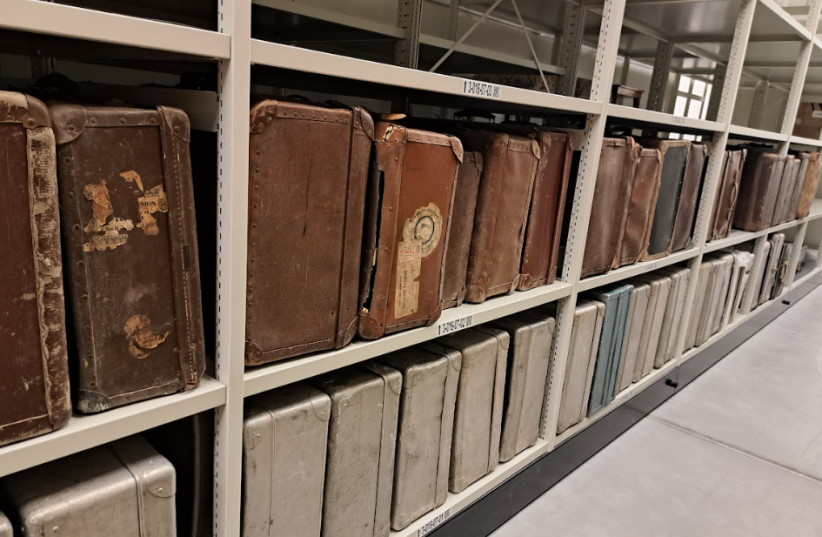A newly built repository is to serve as home for the world’s largest collections of Holocaust artifacts, documents, artwork, and photographs. The Moshal Shoah Legacy Campus and the David and Fela Shapell Family Collections Center will be inaugurated at Yad Vashem on July 8 and have a lasting impact. Slated to attend the opening are President Isaac Herzog; Holocaust survivor and Yad Vashem Council chairman Rabbi Yisrael Meir Lau; Yad Vashem chairman Dani Dayan; and many friends and supporters.
Since its establishment in 1953, Yad Vashem has been at the forefront of Holocaust remembrance and education, fulfilling its mission as outlined in the “Martyrs’ and Heroes’ Remembrance (Yad Vashem) Law.” The institution’s primary mission has always been to “gather, research, and publish the history of the Holocaust.”
Initially, this involved collecting the names of the six million Jewish men, women, and children murdered by the Nazis and their collaborators, as well as recording testimonies from Holocaust survivors. Over time, Yad Vashem’s efforts have expanded to include the collection of written and photographic documentation, as well as art from the Holocaust – all essential to fulfilling its vital purpose.

As the chronological distance from the historic event increases, Yad Vashem has intensified efforts to enrich its collections and ensure that Holocaust-era documentation is preserved. In recent years, Yad Vashem’s leadership has recognized the need to establish a new state-of-the-art home for these “everlasting witnesses” to the horrors, in an effort to ensure their safety for generations to come.
In 2016, Yad Vashem embarked on a meticulously planned and thoughtfully designed three-year project. Skorka Architects was selected to make the plans a reality. In 2019, the official groundbreaking ceremony took place on Holocaust Martyrs’ and Heroes’ Remembrance Day, initiating what has since become the new Moshal Shoah Legacy Campus, which includes the David and Fela Shapell Family Collections Center.
Encompassing 5,800 sq. m. (1.4 acres), the Shoah Legacy Campus hosts the Wolfson Gallery featuring the innovative
video-art wall installation 122,499 Files by acclaimed artist and filmmaker Ran Slavin and curated by Medy Shvide; The Joseph Wilf Curatorial Center; and an expansive sculpture garden showcasing eight art sculptures from Yad Vashem’s Holocaust Art Collection created and donated by renowned artists. At the heart of the campus is the David and Fela Shapell Family Collection Center.
Also planned for the Moshal Shoah Legacy Campus is a new innovative auditorium, providing a facility to seat over 300 people. The Auditorium will host a diverse variety of events throughout the year. The spacious Auditorium Foyer houses exhibitions, which are frequented by visitors to Yad Vashem.
Integration into the tapestry of remembrance
An essential requirement of the new campus’s architectural design was harmonious integration into Yad Vashem’s existing skyline, spanning from the Pillar of Heroism through the Hall of Remembrance to the Monument to Jewish Soldiers and Partisans who resisted Nazi Germany. Skorka Architects designed the campus to be predominantly underground, with only the entrance level above ground. This approach necessitated excavating 30 meters into the Mount of Remembrance bedrock.
Natural spotlight into the past
Over the past seven decades, Yad Vashem has amassed the world’s largest archives of Holocaust-related items – 227.6 million pages of documentation, 135,000 pages of testimony, 541,000 photographs, 33,000 Holocaust-era objects, and 14,000 works of art.
Even more remarkably, while it is now nearly 80 years since the Holocaust ended, these continue to grow in number annually. Yad Vashem’s website, available in eight languages, highlights numerous items from these collections, and more are not exhibited. To bring these lesser-known treasures to light, the architects created a way for the visiting public to view how Yad Vashem maintains the integrity of its collections. Special windows allow the visitor to peer into the four preservation laboratories, and a glass-wrapped “Tree of Life” column runs vertically through the five-story subterranean structure, providing a source of natural light to penetrate the multi-level structure. This spotlight is symbolic of the multi-dimensions of Holocaust remembrance, documentation, and research on the Mount of Remembrance.
A mission and a purpose
The Shoah Legacy Campus and Shapell Collections Center is the preservation hub, for processing, storing, and managing the extensive archival items gathered through various initiatives. The Collection Processes Department and the Conservation Laboratories on the primary floor are dedicated to the physical handling and preservation of collections received in the Pavilion.
After initial intake and disinfection, each item is assigned a dedicated tracking number and assessed to determine its physical condition. Often, items arrive in less than ideal condition. On-site experts at the Conservation Laboratories determine the levels of restoration and preservation required, sorting them according to the various materials in Yad Vashem’s collections: paper (archival and museological); photographs and additional audiovisual materials; textiles; objects; and artwork.
The entire process, from intake to conservation or storage, is documented and digitally stored in Yad Vashem’s Collections Database. This is essential for maintaining an organized catalog, including what measures were used to preserve each of the items, along with guidelines for their storage and display. They are then moved to the appropriate archival storage unit, where the latest technology is utilized to maintain ideal atmospheric and climate conditions. Reduced oxygenated vaults are part of a fire prevention system. A special control room in the building monitors the functioning of these systems to perfectly maintain this irreplaceable national archive.
Everlasting witnesses
Long after the last Holocaust survivor has passed away and eye-witness testimonies exist only in recorded form, these artifacts, photographs, artworks, and archival documentation will be the sole remaining vestiges of the Holocaust victims – both those who were murdered and those who survived.
The Moshal Shoah Legacy Campus and the Shapell Family Collection Center will ensure that humanity always retains proof of the Holocaust’s atrocities. Yad Vashem stands as the guardian of this enduring legacy.
